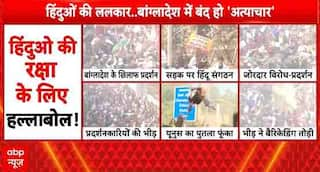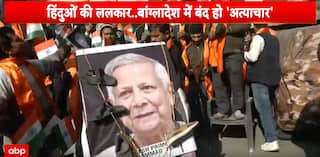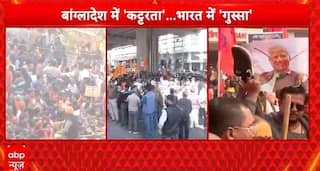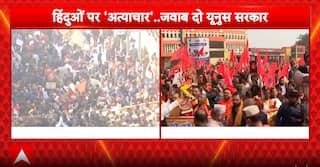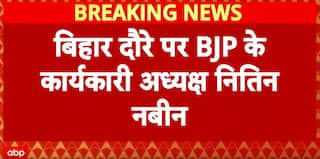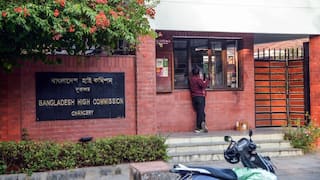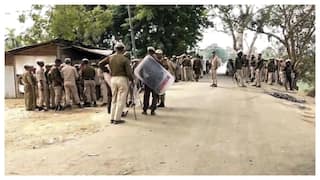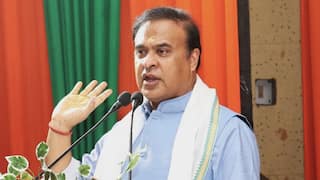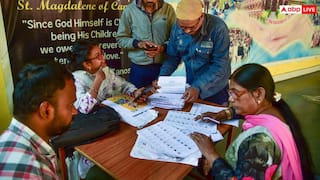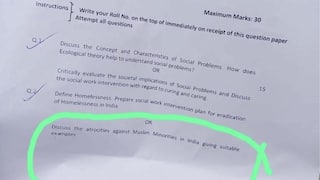Explorer
Karnataka Political Crisis: Speaker Ramesh Kumar In No Hurry To Accept Rebel MLAs' Resignations
The Supreme Court order came after 10 Congress MLAs approached it against the Speaker's refusal to accept their resignations from the Assembly submitted on July 6.

The political crisis in Karnataka entered a new phase on Thursday, with Speaker K.R. Ramesh Kumar showing no mood to take an early decision on the resignation of 16 MLAs of the ruling Congress and JD-S on the eve of the Assembly session where a showdown could be expected. (PTI)
Karnataka Political Crisis: The political crisis in Karnataka entered a new phase on Thursday, with Speaker K.R. Ramesh Kumar showing no mood to take an early decision on the resignation of 16 MLAs of the ruling Congress and JD-S on the eve of the Assembly session where a showdown could be expected. Kumar, who met 13 rebel Congress MLAs this evening after the Supreme Court asked him to do so in the morning, made it clear that he was not rushing into accepting the resignations as he wanted to be "satisfied" which would require a detailed scrutiny. The Supreme Court order came after 10 Congress MLAs approached it against the Speaker's refusal to accept their resignations from the Assembly submitted on July 6. "The legislators wrote their resignation in my office in the prescribed format and submitted to me personally. I will go through them and decide after I hear them personally," Kumar told reporters here after meeting the MLAs. The Speaker asked the legislators to give in writing to him reasons for resigning from their respective assembly segments and that they were doing so voluntarily. "I am answerable to the Constitution of India and people of Karnataka. As per the Constitution, if I am satisfied, then the resignations will be accepted," he said, making it clear that otherwise he will not accept them. "I will communicate to the Supreme Court on Friday that I have acted upon the matter as per the law and in compliance with its order issued earlier in the day," said Kumar. His clear intent to delay accepting the resignations assumes significance as the Assembly will be convening on Friday for a 10-day session. Till their resignations are accepted, the 16 legislators - 13 of the Congress and 3 of the Janata Dal-Secular - would be bound by the whip issued by their respective parties regarding their attendance of the Assembly and any voting therein. And if they violate the whip, they can face disciplinary action, including disqualification, which will bar them from re-election for the remaining period of the Assembly. Both the Congress and the JD-S have issued whips to all their legislators to be present in the Assembly for passing the state Budget (finance bill) and participate in the discussions on other subjects till the session ends on February 24. "The whip has been issued even to the rebels, as their resignations have not been accepted by the Speaker so far," Congress spokesman Ravi Gowda told IANS. Congress Legislature Party (CLP) leader Siddaramaiah has already petitioned the Speaker on Monday to disqualify the party lawmakers who defy the whip, irrespective of their status, or skip the session. The rebels, however, claimed that disqualification would not apply to them as they have already resigned from the Assembly and submitted the letters to the Speaker as well as the Governor on July 6. Of the 13 rebels, 10 are from the Congress and three JD-S. Of them, 10 flew from Mumbai to meet the Speaker at 6 p.m., as directed by a three-judge bench of the apex court headed by Chief Justice Ranjan Gogoi earlier in the day. The Speaker also faulted them for approaching the court. "I have asked them why they went to the top court for its directive to meet me here when I am available to them whenever they need. They could have taken appointment with me after I gave reasons for not accepting their earlier resignations as 8 of them were not in the right format and 5 had to be heard personally to satisfy myself that they were resigning voluntarily," he said. Clarifying that he cannot be deciding on the resignations by midnight as directed by the apex court, as they have to be considered carefully in conformity of the Anti-Defection Law in view of a directive by the Congress to disqualify its members who resigned. "I will inform the honourable court in writing what all transpired between me and the legislators on their resignations and would decide on them at the earliest," said Kumar. When the legislators told the Speaker that they flew to Mumbai on July 6 after submitting their resignations in his office due to life threat to them, Kumar asked why they did not seek protection from the police through him as he was duty-bound to ensure their safety as the custodian of the assembly and the lawmakers. He denied charges by the BJP and others that he was deliberately delaying on accepting the resignations. In the 225-member Assembly, including one nominated, the Congress has 79 MLAs, including Speaker, and JD-S has 37. Lone members of BSP and KPJP (a regional outfit) besides an Independent also were with the government, taking their tally to 118, five more than the required majority mark. If the Speaker accepts all the 16 resignations, the Assembly's effective strength will drop to 209 from 225 and the ruling coalition will be reduced to 100, when the halfway mark would be 105. Besides the 16 MLAs of the Congress and the JD-S, the KPJP legislator and the Independent have also withdrawn their support to the government. On the other hand, the BJP has 105 MLAs and is eyeing the government formation. Meanwhile, Karnataka Parliamentary Affairs Minister Krishna Byre Gowda admitted that the Congress-JD-S coalition government was in a crisis situation after 16 rebel legislators of the ruling allies resigned, reducing it to a minority in the Assembly. He said the state Cabinet agreed to face a no-trust vote, if moved by the BJP in the Assembly.
Follow Breaking News on ABP Live for more latest stories and trending topics. Watch breaking news and top headlines online on ABP News LIVE TV
Read more

ABP Live News
Opinion










